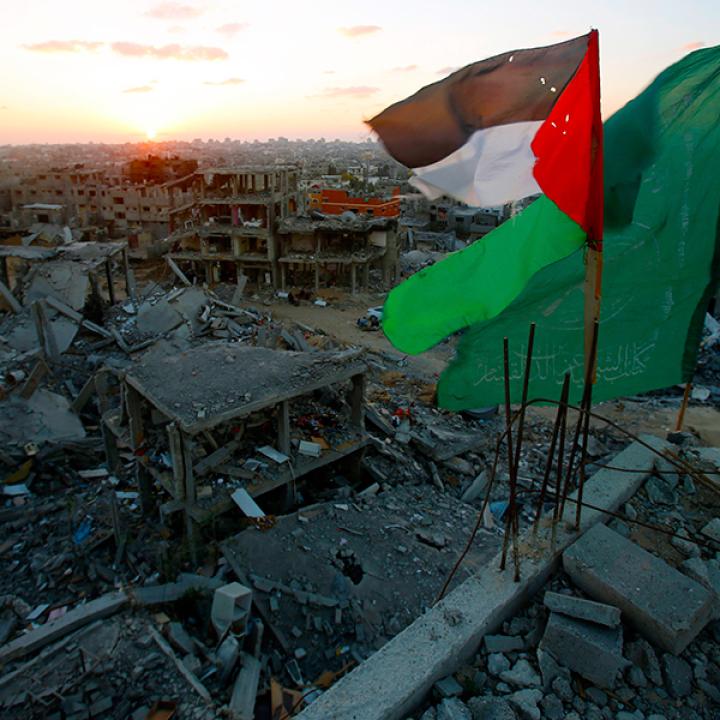
- Policy Analysis
- Policy Alert
Gaza Donor Conference Needs to Send the Right Message on Hamas

Officials at this weekend's summit should reinforce the message that Hamas is not a legitimate go-between for reconstruction assistance, while also pressing PA officials for practical answers about their plans in Gaza.
On October 12, over fifty foreign ministers and high-ranking international diplomats will convene in Cairo to raise money for reconstruction of the Gaza Strip. After nearly two months of war between Israel and Hamas this summer, it is telling that neither of the belligerents will be in attendance. Instead, Secretary of State John Kerry will join with colleagues from Russia, China, Europe, Saudi Arabia, the United Arab Emirates, Turkey, Qatar, and numerous other countries. The only thing a fractious international community can agree on, it seems, is that the Palestinians require -- and deserve -- financial assistance. Beyond the dollar amounts pledged, however, the most important outcome of the conference will be political: the Cairo summit needs to reemphasize that reconstruction aid and a full-scale lifting of the blockade around Gaza remain contingent on Hamas ceding effective control over the territory back to the Palestinian Authority.
The official request put to donors last week by the PA is significant: $4 billion for the "relief, recovery, and reconstruction" of Gaza, and another $4.5 billion for direct budgetary support to the PA through the next three years. To put these figures in historical context, $4.7 billion was pledged at the donor conference held in Egypt after the 2008-2009 Gaza war, including $1.6 billion for reconstruction of the coastal territory. The official Palestinian request then was only $2.7 billion, so the conference surpassed expectations and looked like a success -- at least on paper. In the end, much of the aid failed to materialize, due primarily to continued Hamas rule over Gaza (in place since a violent 2007 coup ousted the PA). Legally and politically, dealing with a U.S.- and EU-designated terrorist organization was impossible for many donors.
This time around, the dollar figures pledged will be important only insofar as they indicate enduring international attention to the Palestinian question. In other words, with so many other crises vying for scarce international aid, will donors meet -- or again exceed -- the target? More to the point, will nominal pledges made under the bright lights of an international conference actually translate into concrete action afterward?
In this regard, those attending the conference must press PA officials on how they plan to implement their recovery and reconstruction plans on the ground in Gaza. Hamas and Fatah (which controls the West Bank-based PA) recently recommitted themselves to the "reconciliation" agreement they signed earlier this year. As part of that agreement, the PA is to assume control over Gaza's border crossings, ministries, and reconstruction projects. Yet it remains to be seen how this will be implemented in practice given that Hamas will not disarm. There are plans in place to redeploy PA security forces to Gaza, though the process for doing so, the scale, and the timeframe remain opaque. Moreover, rationalization of the government bureaucracy inside Gaza has also been mooted, aimed at vetting the approximately 20,000-30,000 Hamas-affiliated civil servants there. In the interim, the official Palestinian intention is to provide a "temporary solution" that would extend some financial compensation to these employees. Here as well, the timeframe for completing the process has been left open-ended.
Answers will therefore need to be given about the mechanics of the PA's return to Gaza, in terms of both the security environment and actual reconstruction work (especially regarding how authorities will monitor dual-use materials such as cement, which Hamas has previously diverted for military purposes). Given its sizeable armed militia, Hamas will still wield an effective veto over events inside Gaza no matter how much nominal political authority it cedes to the PA.
For this reason, arguably the most important outcome of the donor conference needs to be in the messaging from prominent states and nongovernmental actors. The idea needs to be reinforced that the only legitimate conduit for the opening and rehabilitation of Gaza is the PA, and not a terrorist group like Hamas. The group's rejectionism and violence cannot be rewarded with billions of dollars in international aid, especially after it launched a devastating and needless war just three months ago.
Almost as important, officials at the conference need to make clear that there will be repercussions if Hamas violates the postwar reconstruction regime -- whether by diverting dual-use items from legitimate construction projects, tampering with the operations of UN inspectors or staff, or using violent means to coerce returning PA forces or harass Israel. The people of Gaza need to know ahead of time that the obstacle to a better and more hopeful future is Hamas, and that the solution is the PA. If this latest donor conference for Gaza is to be the last, then it has to mark the beginning of the end of Hamas rule over their lives.
Neri Zilber, a visiting scholar at The Washington Institute, is a journalist and researcher on Middle East politics and culture.

